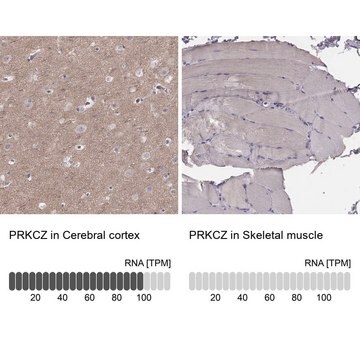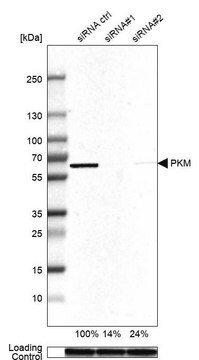MABC946
Anti-PKCζ Antibody, clone 14B12.3
clone 4B12.3, from mouse
Sinonimo/i:
Protein kinase C zeta type, nPKC-zeta, PKC-zeta, PKCζ
About This Item
Prodotti consigliati
Origine biologica
mouse
Livello qualitativo
Forma dell’anticorpo
purified immunoglobulin
Tipo di anticorpo
primary antibodies
Clone
4B12.3, monoclonal
Reattività contro le specie
mouse, human, rat
tecniche
immunohistochemistry: suitable (paraffin)
western blot: suitable
Isotipo
IgG1κ
N° accesso NCBI
N° accesso UniProt
Condizioni di spedizione
wet ice
modifica post-traduzionali bersaglio
unmodified
Informazioni sul gene
human ... PRKCZ(5590)
mouse ... Prkcz(18762)
rat ... Prkcz(25522)
Categorie correlate
Descrizione generale
Specificità
Immunogeno
Applicazioni
Apoptosis & Cancer
Apoptosis - Additional
Immunohistochemistry Analysis: A 1:250 dilution from a representative lot detected PRKCZ in human cerebral cortex, human cerebellum and mouse brain tissues.
Qualità
Western Blotting Analysis: 0.5 µg/mL of this antibody detected PKCζ in 10 µg of mouse brain tissue lysate.
Descrizione del bersaglio
Stato fisico
Stoccaggio e stabilità
Altre note
Esclusione di responsabilità
Non trovi il prodotto giusto?
Prova il nostro Motore di ricerca dei prodotti.
Codice della classe di stoccaggio
12 - Non Combustible Liquids
Classe di pericolosità dell'acqua (WGK)
WGK 1
Punto d’infiammabilità (°F)
Not applicable
Punto d’infiammabilità (°C)
Not applicable
Certificati d'analisi (COA)
Cerca il Certificati d'analisi (COA) digitando il numero di lotto/batch corrispondente. I numeri di lotto o di batch sono stampati sull'etichetta dei prodotti dopo la parola ‘Lotto’ o ‘Batch’.
Possiedi già questo prodotto?
I documenti relativi ai prodotti acquistati recentemente sono disponibili nell’Archivio dei documenti.
Il team dei nostri ricercatori vanta grande esperienza in tutte le aree della ricerca quali Life Science, scienza dei materiali, sintesi chimica, cromatografia, discipline analitiche, ecc..
Contatta l'Assistenza Tecnica.







